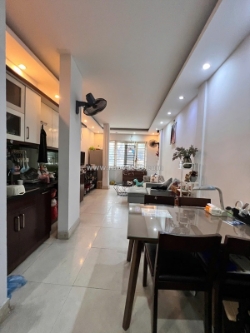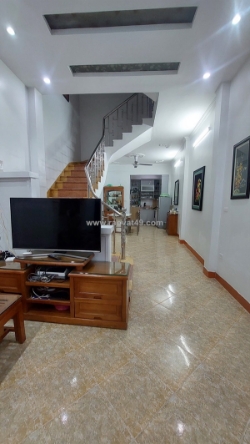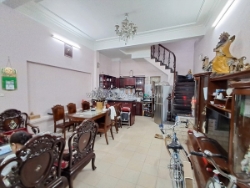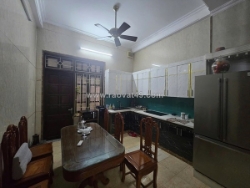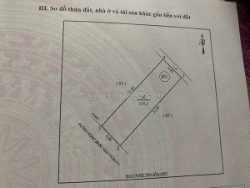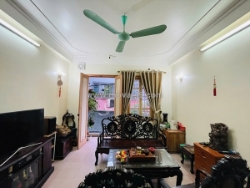Noise reduction technology
Ngày đăng: 3/29/2025 10:21:31 AM - Nhà bán - Toàn Quốc - 58Chi tiết [Mã tin: 5914203] - Cập nhật: 51 phút trước
In today's fast-paced world, clear communication is essential—whether in a busy office, a noisy factory, or a crowded public space. However, background noise can often interfere with phone calls, making it difficult to hear and be heard. This is where industrial anti-noise phone come into play. But how do they differ from regular phones, and which one is right for you? Let's explore the key differences.
1. Noise Reduction Technology
The most significant difference between anti-noise telephones and regular phones is their ability to filter out background noise.
Anti-noise telephones use advanced noise-canceling technology, such as active noise cancellation (ANC) and digital signal processing (DSP), to suppress unwanted sounds. These phones often have multiple microphones that pick up the user's voice while minimizing ambient noise like machinery, traffic, or chatter.
Regular phones typically lack sophisticated noise reduction features. They rely on basic microphone sensitivity, meaning background noise can easily disrupt conversations.
2. Sound Clarity and Volume
Anti-noise telephones are designed to enhance voice clarity even in loud environments.
They often include amplified speakers and adjustable volume settings, making them ideal for industrial or outdoor settings.
Some models also feature equalization (EQ) settings to optimize voice frequencies for better intelligibility.
Regular phones, on the other hand, usually have standard speaker and microphone setups, which may not be sufficient in noisy conditions.
3. Durability and Build Quality
Another key difference lies in their construction.
Anti-noise telephones are often built for rugged environments. They may have water-resistant, dustproof, or explosion-proof casings, making them suitable for factories, construction sites, and other harsh workplaces.
Regular phones are generally designed for office or home use, with less emphasis on durability.
4. Use Cases and Applications
The choice between an anti-noise telephone and a regular phone depends on where and how it will be used.
Anti-noise telephones are ideal for:
Industrial workplaces (factories, construction sites)
Call centers with high background noise
Public areas (train stations, airports)
Emergency and military communications
5. Cost Considerations
Due to their advanced technology and rugged design, anti-noise telephones are typically more expensive than regular phones. However, the investment may be worthwhile for industries where clear communication is critical for safety and efficiency.
Conclusion
While regular phones are sufficient for everyday use in quiet environments, anti-noise telephones provide superior performance in loud and demanding settings. Their noise-canceling technology, enhanced audio clarity, and durable construction make them indispensable in industrial and high-noise workplaces.
If you frequently deal with noisy surroundings, investing in an anti-noise telephone could significantly improve your communication experience. On the other hand, for standard office or home use, a regular phone may be all you need.
Tin liên quan cùng chuyên mục Nhà bán
 1
1Bán tòa văn phòng mặt phố trần đại nghĩa, 210m2, 8 tầng 1 hầm thang máy, mặt
Cập nhật: vài giây trước- 0
Bí quyết học tốt hơn!
Cập nhật: vài giây trước - 0
Hiếm ! chmn 5 tầng - 2 thoáng - 8pnkk- dt > 30 triệu/tháng - full đồ - gần phố
Cập nhật: vài giây trước - 0
Chính chủ cần bán nhà phố lê quang đạo quận nam từ liêm 53 m2 x 6 tầng nhỉnh 10
Cập nhật: vài giây trước  2
2Bán nhà mặt phố bùi thị xuân, 110m2, 8 tầng thang máy, mặt tiền 4.5m, giá 82.5
Cập nhật: 1 phút trước 1
1Bán nhà đại cồ việt, 140m2, 4 tầng, mặt tiền siêu khủng 8m, 46.1 tỷ, ô tô
Cập nhật: 1 phút trước 2
2💥đẹp như mơ💥tt khu 7,2ha vĩnh phúc, ba đình 47/75m 2pn nội thất đẹp, ban công
Cập nhật: 1 phút trước 2
2Chính chủ bán nhà mặt phố thái phiên, 26m2, 5 tầng đẹp ở luôn, giá 20.5 tỷ,
Cập nhật: 2 phút trước 2
2Bán nhà lý thường kiệt, 45m2, 5 tầng, mặt tiền 5.2m, 28.3 tỷ, ngõ rộng thoáng,
Cập nhật: 3 phút trước 1
1Bán nhà biệt thự phố đặng thái thân, 65m2, tầng 1 và tầng 3, mặt tiền 7.5m,
Cập nhật: 3 phút trước 1
1Bán nhà mặt phố chân cầm, 80m2, 72.5 tỷ, kinh doanh siêu đỉnh, phù hợp xây
Cập nhật: 3 phút trước 1
1Chính chủ cần bán nhà phố hoàng hoa thám quận ba đình 37 m2 x 3 tầng nhỉnh 7 tỷ
Cập nhật: 4 phút trước 1
1Bán nhà hàng bài, 45m2, 5 tầng, mặt tiền 5.2m, 30.5 tỷ, ngõ rộng thoáng, kinh
Cập nhật: 4 phút trước 2
2Chính chủ bán nhà lô góc 2 mặt tiền đường trương định, tân mai, tp biên hòa,
Cập nhật: 5 phút trước- 0
Cần bán lô đất chính chủ cực hiếm phố lê quang đạo quận nam từ liêm 80 m2 nhỉnh
Cập nhật: 5 phút trước - 0
Chính chủ cần bán tòa nhà ccmn phố hồ tùng mậu quận cầu giấy 55m 2 x 6 t nhỉnh
Cập nhật: 5 phút trước  2
2Bán nhà 1 lầu mặt tiền chợ liên khu 5-6 tiện kinh doanh đa ngành
Cập nhật: 6 phút trước- 0
Lô đẹp 2 mặt ngõ 80m² – giá hiếm 1,7xx tỷ – ngõ 100 tư thủy hòa nghĩa – zalo
Cập nhật: 6 phút trước - 0
Cực hiếm chính chủ cần bán lô đất phân lô phố minh khai 114 m2 nhỉnh 17 tỷ ô
Cập nhật: 6 phút trước - 0
Cửa gỗ mdf melamine tại tây ninh
Cập nhật: 6 phút trước  1
1Bán nhà ngô thì nhậm, 66m2, 4 tầng, mặt tiền 4.2m, 16 tỷ, ngõ xe máy quay đầu,
Cập nhật: 7 phút trước 2
2🏡 bán nhà tân cổ điển – mặt tiền nội bộ kdc cao cấp trịnh quang nghị
Cập nhật: 8 phút trước 2
2Bán nhà mặt phố phùng khắc khoan, 32m2, 4 tầng, mặt tiền 5m, 28.3 tỷ, kinh
Cập nhật: 10 phút trước 2
2Bắt đầu kinh doanh ngay với nguồn hàng da có sẵn
Cập nhật: 10 phút trước- 0
Chính chủ cần bán tòa nhà phố tôn đức thắng 113 m2x 9 tầng mt rộng giá 70 tỷ ô
Cập nhật: 11 phút trước  1
1Bán nhà mặt phố nguyễn du, 56m2, 6 tầng, 39.5 tỷ, vỉa hè rộng, đường ô tô 2
Cập nhật: 12 phút trước- 0
Cần bán nhà chính chủ phố khuất duy tiến quận thanh xuân 40m2x5 t 6,5 tỷ ôtô
Cập nhật: 12 phút trước  1
1Chính chủ cần bán nhà phố đường đê mới thôn phượng nghĩa xã phụng châu quận
Cập nhật: 12 phút trước 2
2Bán nhà 3 tầng trung tâm – ngõ 50 nguyễn thị lưu, p. bắc giang, tp. bắc giang
Cập nhật: 12 phút trước 2
2Nguồn hàng da sẵn kho – nhập là bán ngay
Cập nhật: 12 phút trước- 0
Chính chủ cần bán nhà phố phú diễn quận bắc từ liêm 33m2 x 4 tầng nhỉnh 4 tỷ ô
Cập nhật: 12 phút trước - 0
Chính chủ cần bán nhà phố ngọc trục đại mỗ quận nam từ liêm 35 m2 x 5 t nhỉnh
Cập nhật: 14 phút trước - 0
Cần bán nhà chính chủ nhà mặt phố đường láng quận đống đa 36m2 x 4 t 8.8 tỷ ô
Cập nhật: 14 phút trước  2
2Bán nhà hẻm điện biên phủ, ngay vòng xoay điện biên phủ, q1, 4x22m, cấp 4, 17,9
Cập nhật: 14 phút trước 2
2Khởi nghiệp nhẹ nhàng với nguồn hàng có sẵn
Cập nhật: 14 phút trước 1
1Chính chủ cần bán nhà phố mỹ đình quận nam từ liêm 30 x 5 t nhỉnh 3 tỷ ô tô kd
Cập nhật: 15 phút trước- 0
Cần bán nhà chính chủ phố lạc long quân quận cầu giấy 87 m2 x7 t nhỉnh 9 tỷ ô
Cập nhật: 15 phút trước - 0
Cần bán nhàchính chủ quận nam từ liêm phố mỹ đình 52 m2 x 5 t 6.8 tỷ ô tô kd
Cập nhật: 15 phút trước  2
2Bán lô 135m2 mặt đường nguyễn sơn, khu tđc trung đô, đối diện handico 69
Cập nhật: 16 phút trước- 0
Chính chủ cần bán mảnh đất phố đỗ đức duc quận nam từ liêm 30 m2 mt rộng 3,9tỷ
Cập nhật: 17 phút trước - 0
Chính chủ cần bán tòa nhà ccmn phố cầu giấy 70 m2 x 7 t mt rộng nhỉnh 10 tỷ ô
Cập nhật: 21 phút trước  2
2Chính chủ bán nhà mặt phố mai hắc đế, 26m2, 5 tầng đẹp ở luôn, giá 20.5 tỷ,
Cập nhật: 21 phút trước- 0
Cần bán nhà chính chủ phố đường láng quận đống đa 43 x 5 t nhỉnh 7 tỷ ô tô kd
Cập nhật: 21 phút trước  2
2Tìm nguồn hàng đồ da sẵn có – giá gốc tận xưởng
Cập nhật: 22 phút trước- 0
Cần bán nhà chính chủ phố phú đô,dt;45m2x4 t,vị trí đắc địa,ô tô kd giá nhỉnh 4
Cập nhật: 23 phút trước  1
1Na spa tuyển gấp kỹ thuật viên làm tại bình thạnh
Cập nhật: 24 phút trước- 0
Chính chủ nhờ bán nhà mỹ đình 76 m giá bán 7.8 tỷ nam từ liêm nhà chủ tự thiết
Cập nhật: 24 phút trước - 0
Cần bán nhà chính chủ phố dương quảng hàm quận cầu giấy 40 m2 x 6 t 7,5 tỷ ô tô
Cập nhật: 25 phút trước - 0
Cần bán nhà chính chủ quận cầu giấy phố nguyễn ngọc vũ 40 m2 x 4 t 7 tỷ ô tô kd
Cập nhật: 25 phút trước  2
2Bán nhà mặt phố triệu việt vương, 32m2, 7 tầng thang máy, mặt tiền 4m, 31.8 tỷ,
Cập nhật: 25 phút trước




